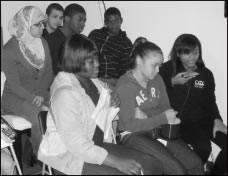BY Aline Reynolds
At 11:30 a.m. Monday morning, seven teens huddled around a small television on the fourth floor at 381 Broadway.
The youths, from City Polytechnic High School in Brooklyn, weren’t watching an instructional video for class; they were chatting with teenagers in Port-au-Prince about Haitian education and culture, and about life since the earthquake.
“How do you feel after the earthquake?” asked 14-year-old Haitian-American Cykia Nelson.
She and her family moved to New York 11 months ago, only weeks before the quake that shook the capital region killed more than 200,000 people.
“You never know when an earthquake will strike again,” said the Haitian schoolgirl. “I’m afraid to die.”
The Polytech students are volunteers of Students Rebuild, a global program committed to redeveloping schools destroyed during the earthquake. Each “team” of classmates from schools around the country is encouraged to raise at least $2,500 in funds. They hand over the donations to Architecture for Humanity, an international nonprofit that works with Students Rebuild to reconstruct Haitian schools.
“We’ve partnered with them to work with the schools they’re helping to reconstruct,” explained Grace Lau, program manager of the Global Nomads Group, an education nonprofit whose headquarters are in Tribeca.
“The kids in the U.S. can really humanize these other people that we hear about in the news,” said Global Nomads Group executive director Chris Plutte.
He and his team initiated the videoconferencing program back in 1998, five years before the popular videoconferencing software Skype was even invented. They have since connected more than one million students in some 40 countries worldwide, reaching all continents including Antarctica.
“We want to get them to see that it’s not just about giving a dollar somewhere and forgetting about it,” said Polytech global health teacher Wilkinson Nestor, who introduced the youths to Students Rebuild last year. “You need to actually get involved.”
Polytech is one of two-dozen schools around North America that is participating in this year’s videoconferencing program with Haiti. Monday’s videoconference session went pretty smoothly, barring a few technical glitches.
About 1,500 miles away, an animated class of Haitian schoolgirls in plaid uniforms sat in symmetrical rows in what looked like a typical classroom. They were in a small private school in Petionville, a suburb of Port-au-Prince, that managed to survive the earthquake. The Global Nomads group installed a videoconferencing hub there in September.
“Do you think your government is doing everything to help you?” inquired a student from Fort McMurray Composite High School in Canada.
One of them assertively walked to the front of the class and said, “The government does nothing. We still have floods, and the schools are still struggling.”
Another said that reconstruction of the damaged buildings hasn’t yet begun, and that they’re still in the clean-up phase. The Haitian girls often chuckled among one another as they took turns answering the questions.
Then came a lighter question: “What music do you listen to?” asked 15-year-old Polytech student Jabari Prahal.
The Haitian students’ faces lit up, spouting off hip-hop, kompa, and other genres. A few of them broke into a short song and dance.
The conversation quickly turned serious again. A student from one of the other schools asked the Haitian girls what they thought of hip-hop artist Wyclef Jean running for president in the November 28 election, which struck up a debate among the Haitian youths.
“He’s in art, not politics, so he probably wouldn’t be a good president,” replied one of the Haitian students. Another contended Jean might be fit for the job. “Unless we try, we don’t know,” she said.
Then it was the Haitians’ turn to grill the Americans. One of them skeptically asked whether their peers up North were “forced” to help out, or volunteered on their own volition.
Prahal replied, “We chose to help you voluntarily. We want to know more about you, and to see similarities and differences we have.”
The videoconference wrapped up around 12:30 p.m., when students from all the schools waved farewell. “We’re here for you, we love you guys, you’re in our prayers,” said tenth grader Destiny Modeste on behalf of the Polytech students.
The Bezos Family Foundation, owners of Amazon.com, will match the donations, dollar for dollar, up to $2,500. Through silent auctions, bake sales and marathons, the Polytech students have ambitiously set out to raise $5,000.
Last year, in the school’s first year, the students raised about $500. To help them reach their goal, “I’m pushing them to come up with other fundraising activities this year,” Nestor said, who meets with the Students Rebuild group once a week after school to brainstorm about donations and upcoming video conferencing sessions.
“I like to help people, and have a lot of friends that are Haitian,” said Pahal, who is looking forward to Thursday’s video conference on emergency education.
Bridging cultural gaps is just as important as the amount of money the students raise.
“I thought it would be fun to learn something new, especially about a culture I don’t know about,” said Modeste, who opted in last year’s Students Rebuild program after learning about the earthquake in her global health class last year.
Despite all the hardships they have faced since, the Haitian students “look happy still,” she said. “They look like they’re doing well.”



































